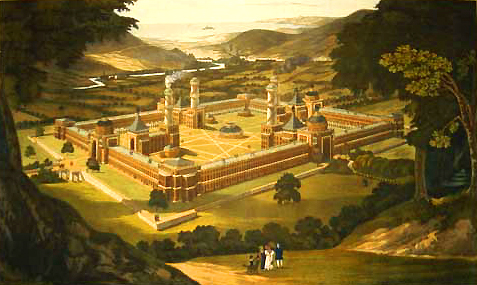What Would Jesus Fund? Financing Religious Enterprises in the Long Eighteenth Century
International Workshop at the University of Tübingen, 9–10 February 2017
organized by Prof Dr Renate Dürr and Dr Lionel Laborie with the financial support of the Research Training Group 1662 "Religious Knowledge in Premodern Europe (800–1800)".
[Programme] [Workshop Report] [Call for Papers] [Download flyer]

A Bird’s Eye View of a Community in New Harmony, Indiana, United States, as proposed by Robert Owen. Engraving by F. Bate, London 1838. Via Wikimedia Commons.
While cliometrics has transformed our understanding of history over the past decades, the new economics of religion remains a comparatively small and emerging field. This is especially true with regard to the early modern period, where data is often incomplete, inconsistent or simply lacking. The economic developments of the long eighteenth century represented a major challenge for Christianity as a whole, in particular for religious dissenters, many of whom worked in crafts and trades. With colonialism, the triangular slave trade and the Industrial Revolution came globalisation, capital accumulation and consumerism. New economic opportunities not only encouraged religious migrations, but also introduced spiritual dilemmas, leading to as many diverging responses from one denomination to another. The Great Evangelical Awakening largely capitalised on colonial expansion and the transatlantic trade to reach new audiences, for instance. Conversely, some radical minorities rejected these evolutions and instead founded self-sufficient societies based on communal property on the model of the New Jerusalem. But who exactly funded these religious enterprises, how and why? What was the relationship, if any, between commercial and religious networks? To what extent did economic opportunities encourage religious migrations? Did dissenting attitudes towards wealth change from one generation to the next?
Programme
Thursday, 9 February 2017
14:30 Welcome and coffee
15:00–15:10 Introduction
15:15–16:45 Session 1 – Halle Pietism
- Kristian Mejrup (University of Copenhagen) – Religious and Economic Migrations in Halle Pietism in the Early 18th Century
- Ulrike Gleixner (Herzog August Bibliothek, Wolfenbüttel) – Funding of Missionary Activities: Supporters and Donators of the Halle Mission to India
- Comments – Tobias Graf (University of Tübingen)
16:45–17:15 Coffee break
17:15–18:30 Keynote
- Mark Valeri (Washington University, St. Louis, USA) – Free Conscience, Conversion, and
Social Realities in Eighteenth-Century America
Friday, 10 February 2017
8:30–9:00 Coffee and tea
9:00–10:30 Session 2 – The English Awakening
- Lionel Laborie (Goldsmiths / University of Tübingen) – From Profits to Prophets: How Capitalism Financed the Great Awakening
- Clive Norris (Oxford Centre for Methodism and Church History) – Methodists and Money in the Long Eighteenth Century
- Comments – Daniel Menning (University of Tübingen)
10:30–11:00 Coffee break
11:00–12:30 Session 3 – The Moravian Brethren
- Christina Petterson (Australian National University) – Communal Economy and Economic Community
- Thomas Dorfner (RWTH Aachen University) – "... denn der Heiland hat unsere vielen Fabriquen gesegnet." The Moravian Church as a Global Economic and Mission Enterprise (1760-1825)
- Comments – Renate Dürr (University of Tübingen)
12:30–13:15 Lunch
13:15–14:45 Session 4 – The Atlantic World
- Laura Dierksmeier (University of Tübingen) – Too Successful for their own Good: Indigenous Confraternities in Eighteenth-Century Mexico
- Alexander Schunka (Freie Universität, Berlin) – Who Will Pay for the Refugees? Financing Eighteenth-century Migrations in a Transatlantic Context
- Comments – Georg Schild (University of Tübingen)
14:45–15:15 Conclusion and general discussion
- Susanne Lachenicht (University of Bayreuth)
